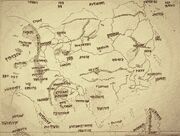
Easterling letters


The various peoples and tribes of Eastern Middle-Earth collectively known as Easterlings in the Westlands spoke a great number of different tribal languages, all descending from the language of the first men of Hildorien, actually derived from Avarin, the language of the East-Elves, the early teachers of mankind.The first sundering among men happened after the Battle of Palisor when many Men fled the east and spread into the western and southern parts of Middle-Earth, among these Lintanoi were the ancestors of the Edain but also the ancestors of the Easterlings of the People of Bór and the People of Ulfang as well as the ancestors of the later Haradrim.
In the Second Age the men of the East had divided into several groups including the Steppe-Peoples or Talataerim of Central Middle-Earth (from whom the Wainriders, Balchoth and Variags emerged), the Líner or eastern Lake-Peoples of the great Inland Seas, the Mornârim of the coldest northern Taiga-Woods (from whom the Axe-Easterlings and Men of the Forodwaith came) and the various peoples of the Farthest East and the Southeast, most prominent among them the Avatani (from whom Khamûl the Black Easterling descended), remote eastern cousins of the First House of the Edain.
See:
Family Tree of the Easterling Tongues[]

- Avarin
- Hildorin (Language of the Hildor)
- Lintanoi (Language of those who fled westwards)
- Asrabiya (language of those who stayed in the East)
- eastern branches of Drûghic
- Avatanin
- Linerin
- Mornârin
- Chegran
- Fustiri
- Umitic (influenced by Khuzdul)
- Fustir-gost
- Labba (influenced by Lossidilrin)
- Urdarin (influenced by Orcish]])
- Narnerin (also the source of the languages of the Utter South)
- Talatherin (language of the Plainspeople of Central middle-earth)
- Hildorin (Language of the Hildor)
Notes:[]
The Easterling Language is preserved only in fragments.The following personal Names are passed down as personal Names of easterlings from Beleriand in the first Age:
Possible other Words:
- Eneköl - Name of a Star
- Gormok - Name of Planet Mars
- Gyürüchill - Name of a Star
- Shomorú - Name of a Star
It is not known what conception Tolkien had about the language of the Swarthy Men of Beleriand ("Baradhrin")), he was not even sure if the names of "Bor", "Uldor" and their sons were from their own native tongue or rather of Sindarin Origin.If the names are treated as easterling in origin possible slavic, anglo-saxon or gaelic influences have been suggested."Orlin" is a given Bulgarian name. "Ban" and "Lorgan" are names from Arthurian literature and may have romano-celtic and old irish origins. "Bor" is a Name from Old Norse Mythology.The Star names are obviously finno-ugric and altaic inspired.
Of the Easterlings of the Second Age only the personal Name Khamûl is preserved as a Name of one of the nine Nazgûl, though possibly it is not his birth-name but a given Name from the Black Speech of Mordor. However there have been conjectures about possible connections to the City Camul (Kumul, Xinjiang) in China or even the celtic God Camulos. It seems to come from proto-Indo European verbs for "to bend", kemb or kamp. The Scottish Gaelic term "cam-bheul", means "wry mouth", or "bent mouth", but Khamûl is spelled in such a way that it looks very Indo-Iranian, resembling examples such as the Panjabi term for "crooked", kham, and the ancient Persian term "khâm", which means "immature" or "incomplete", or perhaps in this case, "half-formed" (see:"Old Wômarin").
Of the Third Age Easterlings only gandalf´s nickname Shorob or Shorab is known as well as the Name of the Land Khand (and possibly the Variags it´s inhabitants) and the great War Oliphaunts or Mûmakil. Shorob/Shorab was Gandalf´s Name in the East (possibly Rhovanion or Dorwinion) and might be from the Language of the Balchoth or Dorwinrim (see:"Pultic" and "Folyavultig"), the actual form might be influenced by Hindi or Setswana, though it could be based,on the name of a Persian hero, "Sohrab". Khand might be influenced by mongolian or sanskrit, if the latter, specifically from the Sanskrit word for "realm", and Variag is of russian/old Norse origin (see:"Varadia"). The Word Mûmak finally might be inspired by egyptian or african languages, though it could come from an ancient Arabic term for "place", "home", or "fortress". However, it must also be remembered in the text often cited for the claim that "Mûmak" was an Easterling term, that Tolkien's exact words were "Of the speech of Men of the East and allies of Sauron, all that appears is mûmak"; this leaves it possible that Mûmak was a Haradrim term all along (see:"Mûmakanin").
References:[]
- Hands of the Healer
- Middle-Earth campaign Guide I
- Lords of Middle-earth II:the mannish Races
- The Wild Lands East and South (Pete Fenlons online Gazetteer)
